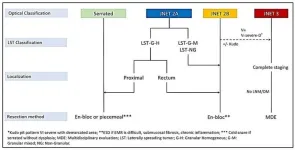(Press-News.org) Middle-aged and older adults believe that old age begins later in life than their peers did decades ago, according to a study published by the American Psychological Association.
“Life expectancy has increased, which might contribute to a later perceived onset of old age. Also, some aspects of health have improved over time, so that people of a certain age who were regarded as old in the past may no longer be considered old nowadays,” said study author Markus Wettstein, PhD, of Humboldt University in Berlin, Germany.
However, the study, which was published in the journal Psychology and Aging, also found evidence that the trend of later perceived old age has slowed in the past two decades.
Wettstein, along with colleagues at Stanford University, the University of Luxembourg and the University of Greifswald, Germany, examined data from 14,056 participants in the German Ageing Survey, a longitudinal study that includes people living in Germany born between 1911 and 1974. Participants responded to survey questions up to eight times over 25 years (1996-2021), when they were between 40 and 100 years old. Additional participants (40 to 85 years old) were recruited throughout the study period as later generations entered midlife and old age. Among the many questions survey participants answered was, “At what age would you describe someone as old?”
The researchers found that compared with the earliest-born participants, later-born participants reported a later perceived onset of old age. For example, when participants born in 1911 were 65 years old, they set the beginning of old age at age 71. In contrast, participants born in 1956 said old age begins at age 74, on average, when they were 65.
However, the researchers also found that the trend toward a later perceived onset of old age has slowed in recent years.
“The trend toward postponing old age is not linear and might not necessarily continue in the future,” Wettstein said.
The researchers also looked at how individual participants’ perceptions of old age changed as they got older. They found that as individuals aged, their perception of the onset of old age was pushed further out. At age 64, the average participant said old age started at 74.7. At age 74, they said old age started at 76.8. On average, the perceived onset of old age increased by about one year for every four to five years of actual aging.
Finally, the researchers examined how individual characteristics such as gender and health status contributed to differences in perceived onset of old age. They found that women, on average, said that old age started two years later than men – and that the difference between men and women had increased over time. They also found that people who reported being more lonely, in worse health, and feeling older said old age began earlier, on average, than those who were less lonely, in better health, and felt younger.
The results may have implications for when and how people prepare for their own aging, as well as how people think about older adults in general, Wettstein said.
“It is unclear to what extent the trend towards postponing old age reflects a trend towards more positive views on older people and aging, or rather the opposite -- perhaps the onset of old age is postponed because people consider being old to be an undesirable state,” Wettstein said.
Future research should examine whether the trend toward a “postponement” of old age continues and investigate more diverse populations in other countries, including non-Western countries, to understand how perceptions of aging vary by country and culture, according to the researchers.
ARTICLE: “Postponing Old Age: Evidence for Historical Change Toward a Later Perceived Onset of Old Age,” by Markus Wettstein, PhD, and Denis Gerstorf, PhD, Humboldt University of Berlin; Rinseo Park, PhD, and Nilan Ram, PhD, Stanford University; Anna E. Kornadt, PhD, University of Luxembourg; Susanne Wurm, PhD, University Medicine Greifswald. Psychology and Aging, published online April 22, 2024.
CONTACT: Wettstein can be reached at markus.wettstein@hu-berlin.de.
The American Psychological Association, in Washington, D.C., is the largest scientific and professional organization representing psychology in the United States. APA’s membership includes over 157,000 researchers, educators, clinicians, consultants and students. Through its divisions in 54 subfields of psychology and affiliations with 60 state, territorial and Canadian provincial associations, APA works to advance the creation, communication and application of psychological knowledge to benefit society and improve people’s lives.
END
People think 'old age' starts later than it used to, study finds
Increases in life expectancy, later retirement could explain shift in public perception of when old age begins
2024-04-22
ELSE PRESS RELEASES FROM THIS DATE:
Afib more common and dangerous in younger people than previously thought
2024-04-22
PITTSBURGH, April 22, 2024 – Atrial fibrillation (Afib), a common type of arrhythmia that is on the rise in people under the age of 65, is more dangerous in this increasingly younger population than previously thought, according to a new study published today in Circulation Arrhythmia and Electrophysiology and authored by physician-scientists at the UPMC Heart and Vascular Institute.
The study, which is among the first to examine a large group of Afib patients younger than 65 in the U.S., found that these younger patients were more likely to be hospitalized for heart failure, stroke or heart ...
To accelerate biosphere science, reconnect three scientific cultures
2024-04-22
Researchers who study Earth’s biosphere tend to operate from one of three scientific cultures, each with distinct ways of conducting science, and which have been operating mostly independently from one another, find the authors of a Perspective published in PNAS on April 19, 2024. SFI Professors Christopher Kempes and Geoffrey West, together with External Professor Brian Enquist (University of Arizona) identify and explain the three cultures, and suggest that reconnecting them could help accelerate ...
Endoscopic techniques for removing large colorectal polyps
2024-04-22
Colorectal cancer (CRC) is the second most common cancer in the United States. This highlights the importance of early detection and treatment of precancerous lesions like large polyps. Endoscopy offers a minimally invasive approach to removing these polyps, reducing the need for traditional surgery.
This review, published in eGastroenterology, explores advancements in endoscopic resection techniques, specifically Endoscopic Mucosal Resection (EMR) and Endoscopic Submucosal Dissection (ESD).
Complete removal of large polyps (>10 mm) is crucial to prevent progression to CRC. Piecemeal resection during endoscopic procedures can increase the risk ...
Speech Accessibility Project now sharing recordings, data
2024-04-22
The Speech Accessibility Project, which aims to make automatic speech recognition technology more accessible to people with speech differences and disabilities, is now sharing some of its voice recordings and related data with universities, nonprofits and companies.
The project team is accepting signed data use agreements and one-page proposals for 211 recordings of people with Parkinson’s. The download also includes text of the original speech prompts and a transcript of the participants’ responses. A subset includes annotations ...
Scientists in Missouri, Virginia receive pediatric heart transplantation research grants
2024-04-22
DALLAS, April 22, 2024 — Scientific researchers in Missouri and Virginia have been awarded nearly $1.4 million each in grants to study ways to extend the life expectancy and improve the quality of life for children with a transplanted heart. These two research awards mark the latest round of funding for a joint $3 million scientific research initiative between the American Heart Association, celebrating 100 years of lifesaving service as the world’s leading nonprofit organization focused on heart and brain health for all, and Enduring Hearts, the only non-profit organization solely dedicated ...
Same species, different sizes: rare evolution in action spotted in island bats
2024-04-22
A University of Melbourne researcher has spotted a rare evolutionary phenomenon happening rapidly in real time in bats living in the Solomon Islands.
Dr Tyrone Lavery reports in a paper published in Evolution that two groups of leaf-nosed bats with vastly different body sizes that were thought to be separate species are an example of a rare type of parallel evolution. Parallel evolution is when different populations living in similar environments evolve similar features independently.
The smaller bat, Hipposideros diadema, is found across its six main islands and many smaller islands. It is ...
New technology uncovers mechanism affecting generation of new COVID variants
2024-04-22
The SARS-CoV-2 virus that causes COVID has the unsettling ability of often generating variants of itself. Other viruses also mutate, but as SARS-CoV-2 quickly spread throughout the entire human population during the pandemic, killing millions, the virus’ dynamic evolution posed a serious problem: it repeatedly challenged our bodies’ immune response fighting the virus and hindered the process of getting updated vaccines ready.
Understanding the genetic mechanism fueling SARS-CoV-2’s ability to generate variants can go a long way in keeping COVID at bay. In this study published in Nature Microbiology, researchers at Baylor College of Medicine and collaborating institutions developed ...
Planning at multiple scales for healthy corals and communities
2024-04-22
Governments in the Mesoamerican Reef region are exploring the use of nature-based solutions to strengthen coral health and societal benefits for coastal communities. A new study led by Stanford researchers in collaboration with scientists from the World Wildlife Fund, the Healthy Reefs Initiative, and others from the Smart Coasts project quantified the outcomes of different watershed interventions to support coral health at regional versus national scales, and identified target areas that could improve both ecosystem and societal benefits nationally and across the region.
The nature-based approaches evaluated as key ...
U of T researchers map protein network dynamics during cell division
2024-04-22
An international team led by researchers at the University of Toronto has mapped the movement of proteins encoded by the yeast genome throughout its cell cycle. This is the first time that all the proteins of an organism have been tracked across the cell cycle, which required a combination of deep learning and high-throughput microscopy.
The team applied two convolutional neural networks, or algorithms, called DeepLoc and CycleNet, to analyze images of millions of live yeast cells. The result was a comprehensive map identifying where proteins are located and how they move and change in abundance ...
Pressure in the womb may influence facial development
2024-04-22
Physical cues in the womb, and not just genetics, influence the normal development of neural crest cells, the embryonic stem cells that form facial features, finds a new study led by UCL researchers.
The study published in Nature Cell Biology found that an increase in hydrostatic pressure sensed by the embryo can hinder the healthy development of facial features in mouse and frog embryos and in human embryoids (cell structures grown in the lab from human stem cells), suggesting that differences in pressure might affect the risk of facial malformations.
The ...
LAST 30 PRESS RELEASES:
Novel camel antimicrobial peptides show promise against drug-resistant bacteria
Scientists discover why we know when to stop scratching an itch
A hidden reason inner ear cells die – and what it means for preventing hearing loss
Researchers discover how tuberculosis bacteria use a “stealth” mechanism to evade the immune system
New microscopy technique lets scientists see cells in unprecedented detail and color
Sometimes less is more: Scientists rethink how to pack medicine into tiny delivery capsules
Scientists build low-cost microscope to study living cells in zero gravity
The Biophysical Journal names Denis V. Titov the 2025 Paper of the Year-Early Career Investigator awardee
Scientists show how your body senses cold—and why menthol feels cool
Scientists deliver new molecule for getting DNA into cells
Study reveals insights about brain regions linked to OCD, informing potential treatments
Does ocean saltiness influence El Niño?
2026 Young Investigators: ONR celebrates new talent tackling warfighter challenges
Genetics help explain who gets the ‘telltale tingle’ from music, art and literature
Many Americans misunderstand medical aid in dying laws
Researchers publish landmark infectious disease study in ‘Science’
New NSF award supports innovative role-playing game approach to strengthening research security in academia
Kumar named to ACMA Emerging Leaders Program for 2026
AI language models could transform aquatic environmental risk assessment
New isotope tools reveal hidden pathways reshaping the global nitrogen cycle
Study reveals how antibiotic structure controls removal from water using biochar
Why chronic pain lasts longer in women: Immune cells offer clues
Toxic exposure creates epigenetic disease risk over 20 generations
More time spent on social media linked to steroid use intentions among boys and men
New study suggests a “kick it while it’s down” approach to cancer treatment could improve cure rates
Milken Institute, Ann Theodore Foundation launch new grant to support clinical trial for potential sarcoidosis treatment
New strategies boost effectiveness of CAR-NK therapy against cancer
Study: Adolescent cannabis use linked to doubling risk of psychotic and bipolar disorders
Invisible harms: drug-related deaths spike after hurricanes and tropical storms
Adolescent cannabis use and risk of psychotic, bipolar, depressive, and anxiety disorders
[Press-News.org] People think 'old age' starts later than it used to, study findsIncreases in life expectancy, later retirement could explain shift in public perception of when old age begins


